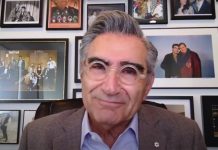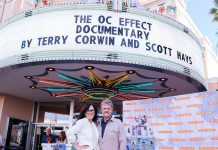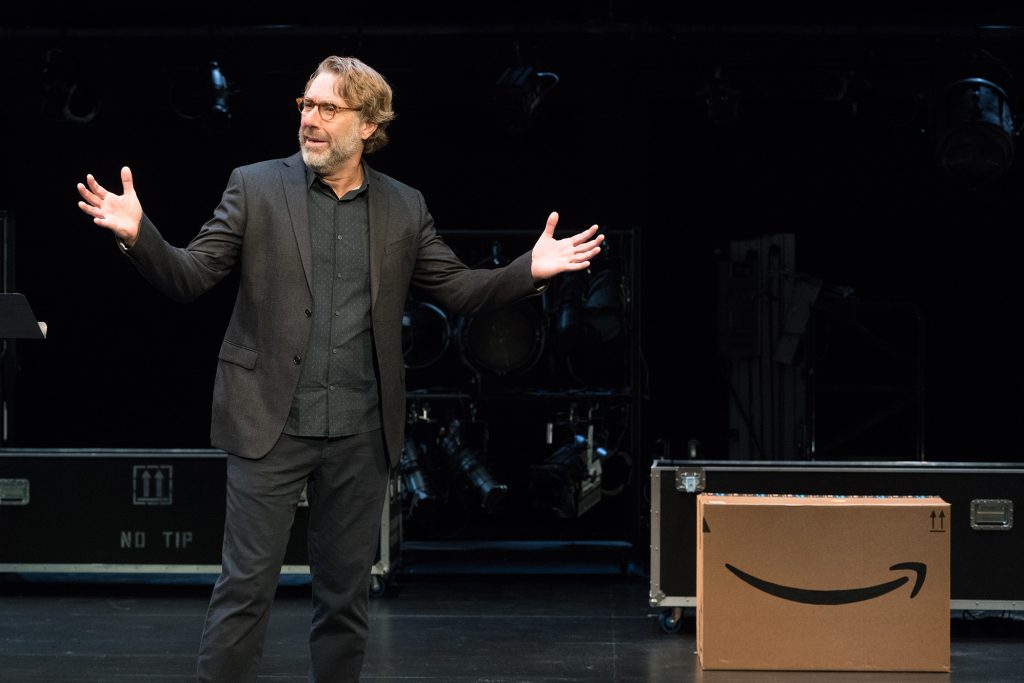
By Eric Marchese | Special to the NB Indy
David Ivers wanders furtively onto the Segerstrom Stage at South Coast Repertory and surveys the audience, then removes his mask, drawing our attention to that particular act.
His first words – “Hello! Welcome back to the theater!” – could precede just about any newly-mounted live production at any venue, as we cautiously begin to emerge from having endured more than 18 months without live performances to enrich our existence.
And as Ivers begins to deliver what amounts to an 80-minute monologue, his initial comments are direct references to theater and to how all of us, whether actors or writers or directors or observers, are a vital part of the process of creating theater.
Of course, Ivers isn’t actually portraying himself. In the world premiere of “A Shot Rang Out,” he embodies “John,” an actor apologetic for having been absent from the world of theater for a handful of years, only now just returning: “I’ve been out of commission for a while, a little lost, and I’m still shaky.”
Aren’t we all? That’s the shared subject of Richard Greenberg’s newest play, cleverly subtitled “A Play in One Man” and written especially with Ivers in mind.
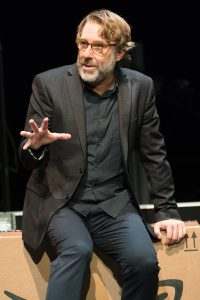
The genius of this solo show is that the words “virus,” “COVID” and “pandemic” are never uttered. John offers specifics in detailing his own personal tribulations, yet speaks in broad enough terms that we find ourselves filling in the blanks and drawing parallels.
It’s also the first time since 2011 that the celebrated playwright and the venerated troupe have collaborated, and for that alone we should be on our feet cheering. And yet while having “A Shot Rang Out” is a blessing, it proves a mixed blessing – some of its facets to be treasured, others clearly in need of further polishing.
The irony inherent in “Shot” is that of a persona spending more than an hour insisting that he’s anything but self-absorbed when his very presence evinces the contrary. It’s a delicious thread of gentle humor that runs through Greenberg’s script from the get-go.
Where “Shot” come up short is that it’s less profound than other Greenberg plays seen at SCR between 1991 and 2011 (“Three Days of Rain,” “Hurrah at Last,” “The Violet Hour” and “Our Mother’s Brief Affair” are just some of their joint triumphs). His forte (among many) is his creation of characters whose interaction generates not just choice dialogue but compelling cross-purposes – non-existent elements in a one-man show. To appreciate this singular new work, we simply have to accept that it’s a different animal from conventional plays that mix characters, plot and dialogue.
Not that Greenberg doesn’t acquit himself. He once again gives SCR patrons a craft rich in often poetic language. The script’s cascades of words flow over us, and we can only luxuriate in them. In many ways, “A Shot Rang Out” is classic, quintessential Greenberg. Only a Greenberg characters could relate that having “life” is not the same as having “a life” or that theater people “aren’t ‘people,’ they’re ‘as-if people’.”
Watching a play, John says, is akin to a hostage situation – we’re trapped in our seats until the play ends. How can anyone watching “A Shot Rang Out” not chuckle while recognizing the acuity of this observation?
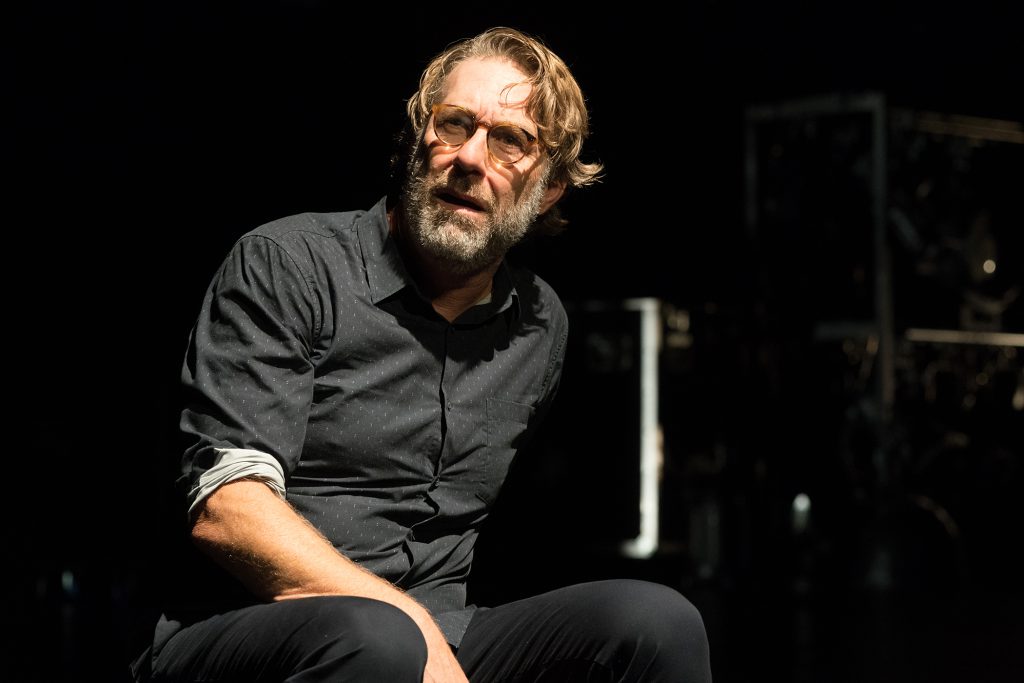
As funny and rueful is John’s question “Is there a more hateful word in the English language than ‘suddenly’?” The concept of suddeness informs the play’s title and, indeed, much of the play.
Meanwhile, lines like “And then the silence consumed me, and my exile was complete” prove starkly compelling.
Late in the play John makes a passing reference that while immersed in a horrifying personal crisis, “the whole planet was in an uproar. There was a catastrophe afoot of unprecedented scope” – a striking description of what has gripped the entire globe for coming up on two years.
He says “No one was exempt” from this bleak scenario, adding, “That I’m still here proves nothing.”
Director Tony Taccone’s credits brim with dozens of one-person shows, many starring notable celebrities, and that skill is apparent in a fluid staging so natural it brings to mind a flower blooming before our eyes.
Ivers’ work is stronger than the script he delivers. If a phrase like “tour de force” is possibly overused in such a context, in this case it’s 100% accurate. As John reacquaints himself with being on stage, Ivers’ erudite voice quivers with emotion, gradually regaining his self-assurance. His diction is crisp as he paints a broadly theatrical persona that edges, sometimes comically, toward bombast.
While “A Shot Rang Out” shows that Greenberg is, as always, a consummate master of the seamless flow of ideas, it’s less theatrical than his greatest works and so can’t be said to be as deeply moving.
Yet “Shot” isn’t merely an intellectual exercise, either. John tells us he first entered a theater at age five and that since then, he has always regarded such edifices as sacred and that the very act of creating theater is all-encompassing and life-affirming.
The word “hope” is notable throughout the evening. Even after having passed through countless dark nights of the soul, John values hope and continually searches for it, and for anything in his reality that might generate any reason for optimism.
The play’s concluding image is a visual metaphor urging us, without getting too sticky or corny, to emerge from darkness and to endeavor to foster within ourselves a sense of wonder, of renewal, of hope.
Segerstrom Stage, South Coast Repertory, 655 Town Center Drive, Costa Mesa. Through November 6. Running time: 80 minutes (no intermission). Tickets: $26 to $93 (discounts available for seniors, educators and those age 25 or lower). Purchase/information: (714) 708-5500, www.scr.org.
Eric Marchese has written about numerous subjects for various publications since the mid-1980s but is best known for his coverage of Orange County theater.



